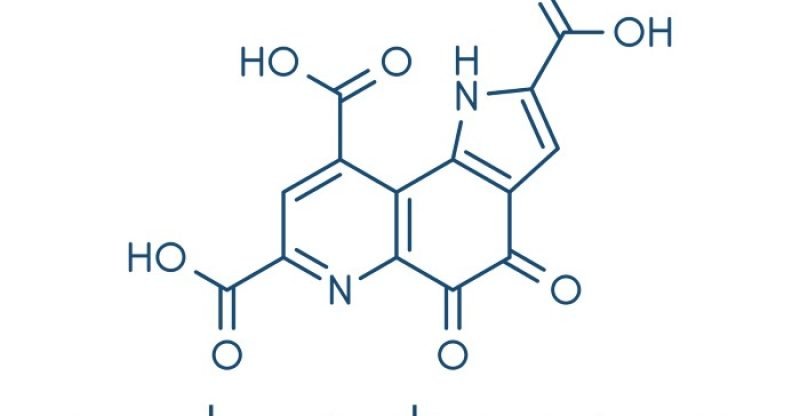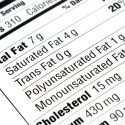12 Evidence-Based Benefits of PQQ Supplement
You’ve probably heard about minding your Ps & Qs, but have you ever heard about PQQ?
What is PQQ? And what does it do?
This handy compound might actually play a role in enhanced health and increased longevity.
What is PQQ?
The letters PQQ stand for pyrroloquinoline quinone.
Try to say that ten times fast. This redox cofactor is useful at reducing oxidants in cells.
Redox simply means reducing oxidants, while a cofactor helps in the process of another function.
Some types of cofactors assist enzymes in working better throughout the body.
Other types of cofactors are responsible for facilitating the transfer of electrons.
This is important to help the mitochondria within the cells to produce energy.
You may have heard of some of the common cofactors that help to transfer electrons, such as glutathione, CoQ10, and even Vitamin C.
Because each cofactor has different ways that they work in the body, their effects will be different, as well.
Pyrroloquinoline quinone was first isolated in 1979 as a cofactor that affects enzymes within bacteria (1).
This is similar to the way that vitamins work within the body, though PQQ is not a vitamin.
While still providing vitamin-like cofactor properties in humans, it seems that PQQ is more likely to have an effect on certain types of protein, rather than on enzymes (2,3).
Some of the primary PQQ benefits include the ability to increase energy production within cells, and to assist in the formation of new mitochondria, as well (4).
“What are mitochondria?” you may ask.
You can think of mitochondria as sort of the batteries inside of cells that can increase cellular energy production and help with cellular metabolism of energy.
This helps cells to do their jobs more effectively.
Pyrroloquinoline quinone acts a bit like a growth factor in the human body.
It is found in high levels in breast milk and may be important for the proper development of infants.
Animal studies show that deficiencies in PQQ can actually limit growth and reproduction (5).
This cofactor can be found in mammalian tissues, with concentrations of around 0.8-5.8ng/g in humans.
While not actually a growth factor, this protein enhances the function of other proteins in the body that can affect growth and development.
PQQ Benefits
While being known primarily for its ability to enhance energy production within cells, PQQ has many equally important functions within the human body.
Let’s take a look at these 11 benefits.
Helps to Form New Mitochondria
In addition to their energy-producing activity and antioxidant effects, mitochondria may play a much larger role in overall health and longevity.
When mitochondria within the cells begin to fail, this can lead to many diseases, especially those that are commonly related to growing older.
Compounds, such as pyrroloquinoline quinone, can actually stimulate the biogenesis, or creation, of mitochondria.
In the case of PQQ, this may occur through the activation of certain proteins and binding proteins and their related pathways (6).
These special proteins are responsible for stimulating the genes that assist with mitochondrial growth, respiration, and proliferation.
Healthy mitochondria continue energy production within cells so that they can function properly.
By assisting with the health and production of mitochondria, PQQ can help to stave off some of the effects of cell aging.
The antioxidant properties of this compound can protect cells from the damaging effects of oxidation over time.
This protein cofactor also helps to protect cells from environmental invaders, like toxins and UV radiation.
PQQ’s ability to provide energy in cells can also have a positive impact on your blood pressure, aid in the breakdown of triglycerides and cholesterol, and may even reduce your risk of obesity.
May Protect the Heart
The protective benefits of PQQ might be important for the heart, especially following a heart attack.
Studies in rats show that administration of pyrroloquinoline quinone can reduce the damage that is caused by an acute heart attack (7).
During this research, it was found that it didn’t matter if PQQ was given before or after the major cardiac event.
Positive protective benefits were found in either case.
When compared to a typical clinical treatment used following a heart attack, a beta blocker known as metoprolol, PQQ performed better.
Both the beta blocker and PQQ were good at reducing the size of the area that was damaged and potential muscular dysfunction of the heart.
However, PQQ was much better at reducing damage at the cellular level.
This is found to be because of pyrroloquinoline quinone’s ability to boost the health of mitochondria, to reduce oxidative stress, and to diminish cell death (8).
If researchers can show that these effects occur equally in humans, PQQ might be beneficial for us to have on hand in case you or a loved one experiences a heart attack or a similarly destructive cardiac episode.
Reduces Inflammation
While inflammation may be good to some extent in our bodies as a crucial part of the healing process against foreign invaders and infections, continuing inflammation can have a negative impact.
One way that health care providers can detect inflammation in the body is by checking the levels of C-reactive protein, commonly referred to as CRP.
High levels of CRP mean that there is inflammation present throughout the body.
Research has found that PQQ can play a vital role in reducing inflammation in humans.
Subjects who were given PQQ were shown to have lower levels of C-reactive protein in their urine, proving that there was less inflammation present in the body (9).
Additionally, these studies showed that there was less oxidative stress on the body in those who were given PQQ, as was noted via certain other markers in the urine tests.
As you may already know, antioxidants play a role in reducing inflammation through the body.
These results are significant and should be followed up on to determine whether this anti-inflammatory response is triggered by the antioxidant effects of PQQ, or through some other mechanism of this protein cofactor that would make it uniquely effective compared to other antioxidants.
Shows Neuroprotective Benefits
Pyrroloquinoline quinone may play a strong role in keeping the brain healthy and functioning properly.
PQQ has been found to increase the production of DJ-1, which is a protein that may protect against certain degenerative brain conditions (10).
When PQQ increases DJ-1, this provides protection from oxidation and cell death while increasing cell survival rates.
Because mutations of DJ-1 can trigger the onset of certain neurological disorders and rare hereditary forms of Parkinson’s disease, maintaining healthy levels of this protein through the use of PQQ may be found to delay or even prevent the occurrence of these disorders.
The effects of PQQ on areas of damage following a stroke are similar to its effects following a heart attack.
Following a stroke, PQQ intake can result in a decrease of the potential area of damage (11, 12).
Overstimulation of neurons over a longer period has also been shown to increase the risk of certain degenerative diseases of the brain.
PQQ may reduce this excitation of neurons, which in turn increases its neuroprotective benefits.
Certain toxins can increase your risk of developing degenerative brain diseases.
Mercury is suspected to lead to Alzheimer’s disease (13).
Oxidopamine is a toxin that might be a cause of Parkinson’s disease (14).
PQQ could be a powerful protector against neurotoxicity (15, 16).
This protein cofactor may also prevent these degenerative brain diseases by averting the aggregation of certain proteins (17, 18).
Increases Nerve Growth Factor for Better Brain Function
PQQ supplement has been shown to stimulate the production of nerve growth factor.
NGF is associated with the survival of brain cells and is important for proper functioning of the brain.
Pyrroloquinoline quinone also stimulates the production of Schwann cells (19).
If you don’t know what Schwann cells are, that’s okay.
You may not know their name, but you’ve probably heard about the vital role that they play in nerve health.
Schwann cells help with the protection of nerves and the transmission of nerve signals, especially in the peripheral nervous system.
Schwann cells are responsible for the development of the myelin that covers nerves and allows for better signal transmission between the brain and other areas of the body.
May Enhance Reasoning and Memory in the Brain
In addition to the other brain-boosting benefits of PQQ, memory, and reasoning may also be improved.
This is because PQQ triggers certain binding proteins, such as CREB-1, that assist with genetic expression and growth (20).
This also assists in the creation of new mitochondria for improved cell health, specifically within brain cells.
With all of the positive brain-boosting effects of PQQ, it should come as no surprise that studies on rats have shown that this cofactor can actually reverse the impairment in cognition that was caused by oxidative stress.
Equally as important is that pyrroloquinoline quinone was shown to have a similar effect to Vitamin E on memory function in rat studies (21).
With such positive effects on brain cell health, cognitive function, and memory, PQQ plays a vital role in overall brain health.
Good for Proper Immune Function
You’re probably well aware of the importance of antioxidants in the proper functioning of the immune system and in the prevention of disease.
Because PQQ has such a powerful effect on oxidation, it can boost the ability of the immune system to do its job.
In studies, mice that were provided diets deficient in PQQ-rich foods had a reduced immune response to stressors (22).
Another study demonstrated the immune-boosting effects of PQQ when added to the diet of mice through an increase in important immune system regulators.
Further research in this area may find that PQQ can help to reduce the occurrence of certain diseases.
It may even play a role in regulating the immune response in those with autoimmune disorders.
May Reduce Certain Types of Cancer
The immune system is vital in fighting off unwanted invaders in the body, including cancer cells.
Antioxidants also fight free radicals, which can lead to the production of cancer cells.
Because PQQ boosts the immune system and has antioxidant properties, this protein may play a vital role in the prevention of cancer.
And there are additional effects that PQQ may have on certain types of cancer, research on which shows some promise.
This protein cofactor has a cytotoxic effect on specific kinds of leukemia cells (24).
PQQ has also been shown to have an impact on certain melanoma cells (25).
Protects Against Obesity
Because pyrroloquinoline quinone triggers mitochondrial production, energy is boosted within the cells.
This increase in energy also helps to increase cellular metabolism, helping them to utilize energy more efficiently.
This can reduce the storage of excess energy via the calories we consume, preventing weight gain and even obesity in some cases.
While no studies have been done to determine if there is a direct association between PQQ levels and obesity, it stands to reason that the link might be worth looking into.
During efforts to lose weight, we’re advised to eat a healthy diet and to engage in exercise.
Exercise can increase metabolism by making the cells work more, thus burning energy.
Additionally, certain types of exercise can increase muscle mass.
Muscle helps to increase metabolism, as well.
When cells are using energy properly, this can reduce energy storage in the form of fat.
Also, if you need to burn off more calories than you consume, the body must turn to stored fat in cells for the necessary energy.
This can lead to weight loss.
Increases Insulin Sensitivity
Not only can overeating result in the accumulation of excess weight via stored fat tissue, it can also result in insulin resistance that is induced by excess fat in the body.
This excess fat can be stored or may be gained through the diet.
Studies in rats showed that those given PQQ had increased insulin sensitivity, even when used in conjunction with a high-fat diet, over those that were not given PQQ (26).
Shows Improvements for Sleep
Pyrroloquinoline quinone can be a good way to get your zzzs, in a couple of ways.
First, PQQ has been shown to help individuals fall asleep faster.
Second, this protein cofactor has also been shown to improve the quality of sleep.
Human studies have been conducted with supplementation of 20 mg daily of PQQ over an eight-week period (27).
The individuals in the study either had high levels of fatigue, or some type of disorder that impaired their ability to get a good night’s sleep.
After four weeks, or halfway through the study, these individuals noted an increase in sleep duration as well as improved quality of the sleep that they got.
It took the full eight weeks before noticeable results were seen for getting to sleep more quickly.
Not only was sleep improved for the individuals in this study, but so was energy level, mood, pain, appetite, and overall quality of life as reported by these individuals during testing.
It’s important to remember that this was just a single study on a small group of individuals.
Also, these individuals already had some type of sleep problems.
However, due to the positive results of this study, it could prove to be beneficial to do further research on how PQQ might enhance the quality of sleep in otherwise healthy individuals, as well as those with sleep disturbance issues.
PQQ Side-Effects
So far, side-effects of pyrroloquinoline quinone are most likely related to potential toxicity when taken in very large doses.
I know that the word “toxicity” may induce feelings of panic and prevent you from seeing the important roles that PQQ plays in the body, but hear me out.
PQQ is found naturally in many food sources and shows many benefits for the body.
It has just recently come out as a popular supplement and appears to be safe when taken for short periods of time in low doses.
There might be a risk of liver or kidney damage when taken over very long periods of time, even in low doses.
Death from PQQ is rare and has only occurred when taking exceptionally high doses that are impractical.
Other PQQ side effects that might occur from taking these supplements include a headache and excitation.
Precautions
Because PPQ supplementation is fairly recent, there have been no human studies on its long-term use, outside of consuming natural food sources.
Because PQQ is a necessary nutrient for human health, and deficiencies have been shown to lead to certain types of disease, you might want to consider a supplement if you feel you aren’t getting enough.
However, it could be best just to take PQQ for a few weeks at a time, giving your body a break in between.
This can reduce the chance of developing problems associated with overuse, and may even reduce your chance of developing side-effects.
You may also want to cycle your use of this compound by alternating days over the period of a few weeks just as an added precaution, especially if you’re sensitive to supplementation.
Dosing
If you choose to go the route of taking PQQ supplements, they are available in several low doses.
There has been no established level of safety for supplements of PQQ, so it could help to start with the lowest milligram dosage available.
Remember that it is best only to take these supplements for a few weeks at a time before giving your body a break, to reduce the risk of unwanted side-effects.
Many of the studies that I’ve used were done for eight and twelve weeks.
In these studies, no toxicity was shown in study participants.
However, these supplements were provided under the supervision and in a controlled environment.
When taking supplements on your own, it’s always better to go slow.
In most cases, the kinds of PQQ supplement that are available will be in the 20 to 40 mg range.
While taking as little as 2 mg may have benefits for your health, it can be difficult to find such a low dose available in a supplement.
This makes it even more important to take these supplements for only a short period.
While PPQ is mostly metabolized by the body within 24 hours, some residue can linger in the skin and the kidneys.
PQQ-Rich Foods
When it comes to getting the nutrients that your body needs, it’s almost always better to try to obtain your nutrients from natural food sources.
Supplements are good for those times when you cannot eat a healthy and balanced diet, or for when your body could use a higher, more therapeutic dose.
Because PQQ cannot be created by the body, you must get sufficient amounts from the foods that you eat.
For those individuals who require a diet of about 2,000 calories, 100 to 200 micrograms of PQQ seems to be sufficient for everyday needs.
You can find at least trace amounts of PQQ in nearly all food sources (28).
In fact, research methods have shown levels between 0.19-61ng/g in nearly all of the foods that were tested, in one study (29).
However, certain foods do contain more concentrated amounts of this compound, so it could be beneficial to incorporate more of these foods into your diet as long as you don’t have any dietary restrictions.
Amounts of PPQ shown are per nanogram for each gram of the identified food source.
- Fermented soybeans – 61
- Parsley – 34
- Sweet peppers – 28
- Kiwifruit – 27
- Papaya – 26
- Tofu – 24
- Spinach – 21
- Carrots – 16
- Potatoes – 16
- Cabbage – 16
As you can see, even with fermented soybeans containing 61 nanograms of PQQ, you’d have to eat a lot just to get a therapeutic dose of even 5 mg.
This makes eating PQQ-rich foods much better for overall prevention of potential problems rather than for any real, therapeutic benefit.
You might be thinking that at least you won’t risk any chance of toxicity by simply getting your PQQ needs met through food sources.
While you’d be correct, it’s important to note that there might come a point where you would want the added benefits to the body that are provided by PQQ supplementation, such as for neuroprotective benefits.
Conclusion
PQQ is necessary for good health, and deficiencies in this nutrient can result in some potentially troubling health concerns.
Because PQQ is not produced in the body, you will need to make sure that you get enough of this compound from either food or supplement sources.
Getting your PQQ solely from food sources may not be sufficient to provide noticeable improvements to health, so taking a low-dose supplement may be preferable, in some cases.
Choose the lowest dose of supplement that you can find, and only take this dose for a few weeks at a time.
If your doctor recommends that you supplement with PQQ, follow their instructions and discuss any concerns that you might have with your healthcare provider.
It’s important that you take an active role in your health.
Eating healthy foods, exercising, and taking supplements when necessary are necessary steps in this process.
However, maintaining positive communication with your health care provider is crucial, as well.
FDA Compliance
The information on this website has not been evaluated by the Food & Drug Administration or any other medical body. We do not aim to diagnose, treat, cure or prevent any illness or disease. Information is shared for educational purposes only. You must consult your doctor before acting on any content on this website, especially if you are pregnant, nursing, taking medication, or have a medical condition.
HOW WOULD YOU RATE THIS ARTICLE?






